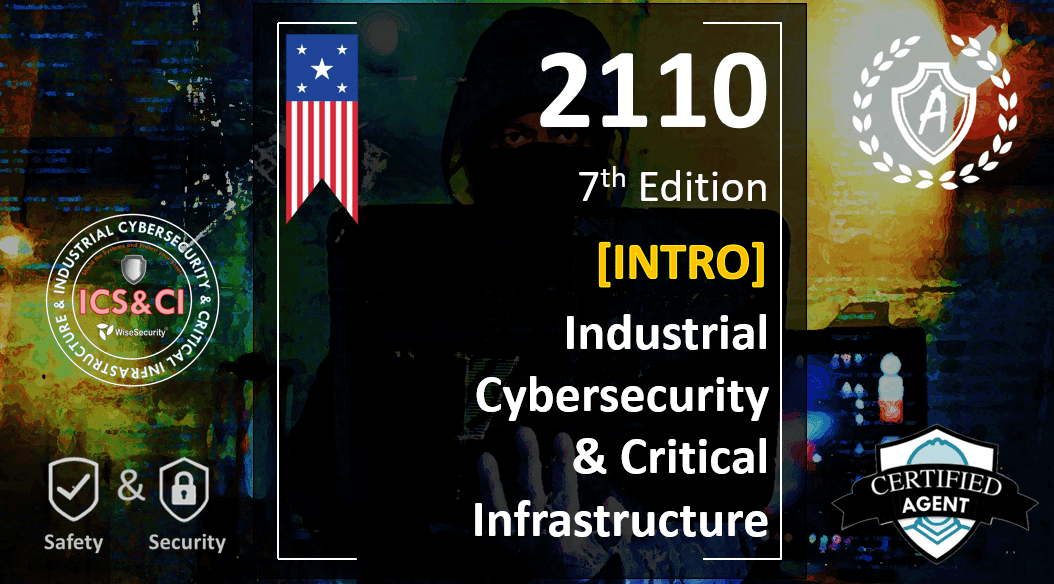Recommend or Share:
The attendee will have a clear vision of the technical aspects of the ICS&CI (Industrial CyberSecurity & Critical Infrastructure) and the life cycle of an Industrial Cybersecurity Program. It will also help the professional interested in ICS & CI to plan his career and professional certification, as well as confirm his expectations. It is ideal for all professionals who want to evaluate the next steps to follow, both professionally and within the organization for which they work.
At the end of the 2110 course, you will be able to:
- The attendee will have a sharp vision of the technical aspects of Industrial Cybersecurity and Critical Infrastructures and the life cycle of an Effective and Comprehensive Industrial Cybersecurity Program.
- You will understand the differences in scope and objectives of the multiple organizations that publish standards, guidelines, policies, recommendations, and best practices for Industrial Cybersecurity. You will learn to differentiate between each of them and what each one is for.
- Furthermore, you will understand the Fundamentals and Priorities of Industrial Cybersecurity and its differences with Corporate Cybersecurity.
- It will be able to move forward with an Industrial Cybersecurity Program in a much faster and more secure way, with a very high level of trust.
- It is ideal for any professional who wants to evaluate the next steps to follow, within the organization for which he works.
- Not only that, but it will help the professional interested in ICS&CI to plan their career and professional certification, as well as confirm their expectations.
You will cover the following topics on the course:
- Definition of Critical Sectors, dependencies, and interdependencies.
- Statistics of real incidents and attacks in recent years and several example cases will be explained and analyzed.
- We will present the different ICS&CI norms and standards so that they recognize when and where each one applies.
- Fundamental concepts of Industrial Cyberseucity.
- Clearly identify the differences between Industrial vs Corporate or IT Infrastructure and the importance of these differences to understand vulnerability protection and remediation methodologies.
- Requirements and stages to follow in the Implementation of an Industrial Cybersecurity Program for all Norms and Standards.
- Steps to follow for the successful implementation of an Industrial Cyber Defense System according to the ISA99/IEC-62443 standard.
- Design and implementing safety in existing or future industrial systems in engineering stages.
Who is it for?
- Recommended for all personnel in industrial sectors such as: energy, water, oil, gas, steel, food, pharmaceutical, and many others, who are related to the activities of protection of critical infrastructure and control systems.
- The participation of IT security managers, system integrators, suppliers of industrial control systems, plant engineers, production management and plant operation, industrial security, specialists in safety instrumented systems and maintenance personnel is recommended, whether they are high or middle management.
- Teachers specialized in related careers.
Requirements:
It has no specific requirements. However, it is recommended that the professional has knowledge of:
- Supervision and Automation Systems of Industrial Processes, such as: Distributed control systems and SCADA systems, as well as knowledge of Industrial Systems Networks, Industrial Protocols, FieldBuses, etc.
- Knowledge of IT, Corporate Data Networks, and prior knowledge in Corporate Cybersecurity.
Deliverables:
Participants will receive through the educational platform the material digitally, including the following materials.
- Access to the lessons of the course in an online way.
- Various documents, videos, and complementary material for participants to deepen.
- Access to the educational campus to download complementary information and software.
Modality and Schedules:
This course is available in all face-to-face modalities (in WisePlant Offices, in customer’s Plant, in Academy) and Virtual (Synchronous, Asynchronous and On Demand). Even in face-to-face modalities, the course requires participants to use the Educational Platform to access the abundant complementary material and to take the Final Evaluation. Duration: 16 hours with the teacher, including the final evaluation.
Certificate: Industrial Cybersecurity and Critical Infrastructures Agent
- CRE Credits: 1.6
- The exam to obtain the certification is taken in class at the end of the course. Available in Spanish, Portuguese and English.
Summary of the outstanding features of the course:
- Available in Spanish and Portuguese, both the voice-over and the complete course material. The course material will be available for consultation in the Educational Campus (asynchronous) both in Spanish and in Portuguese and English languages.
- Includes online practical exercises. Each attendee remotely accesses from the campus to a dedicated computer networked with the rest of the computers in the course to perform several practical exercises of Cybersecurity in networks with specific software and applications.
- Abundant supplementary reading material.
- Virtual group study meetings until taking the exam, even after the end of the course.
- The assistant can enter the Campus to consult the course material for a period of 1 year.
- Coaching, chat, and blog 7×24 for a period of 1 year, assisting in the implementation of the acquired practical knowledge in your organization.
Recognitions
All participants who meet the course requirements and who successfully pass the final exam with a good grade will be awarded a Digital Badge. The Digital Badge certifies that the participant has attended the 2110 training course and has taken the final evaluation test with a good grade, verifying that said participant has assimilated the new knowledge.



